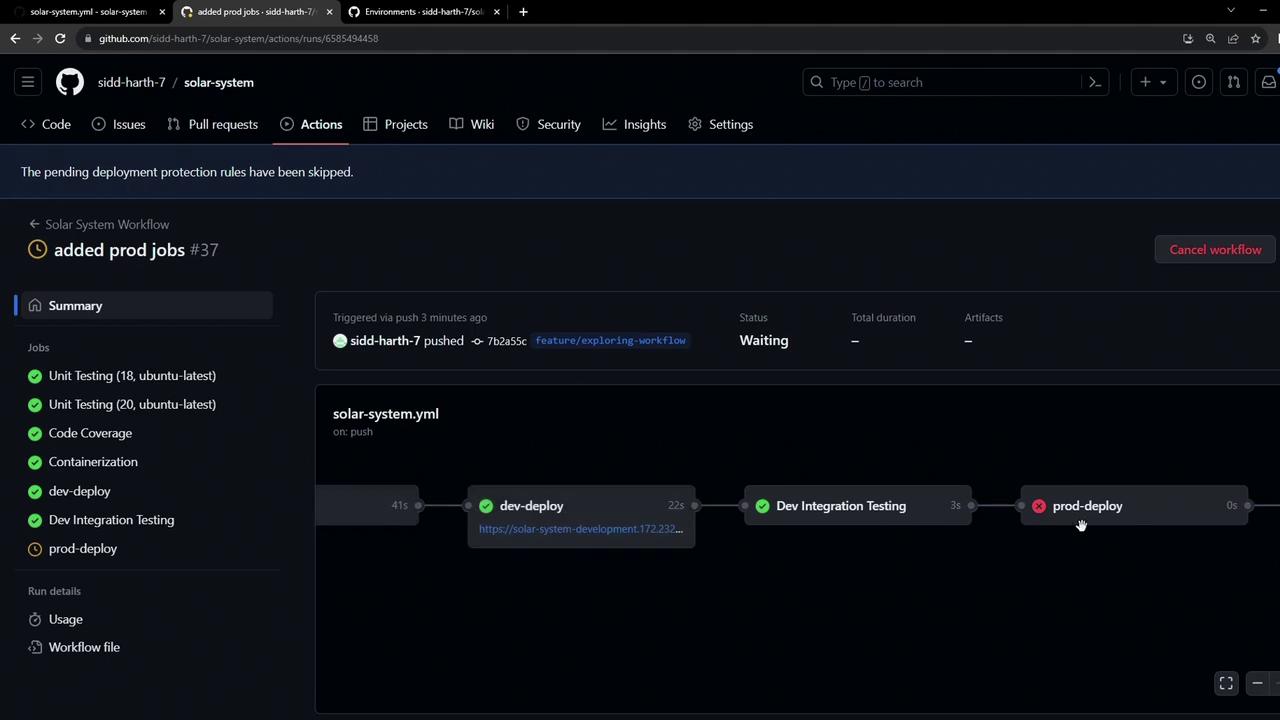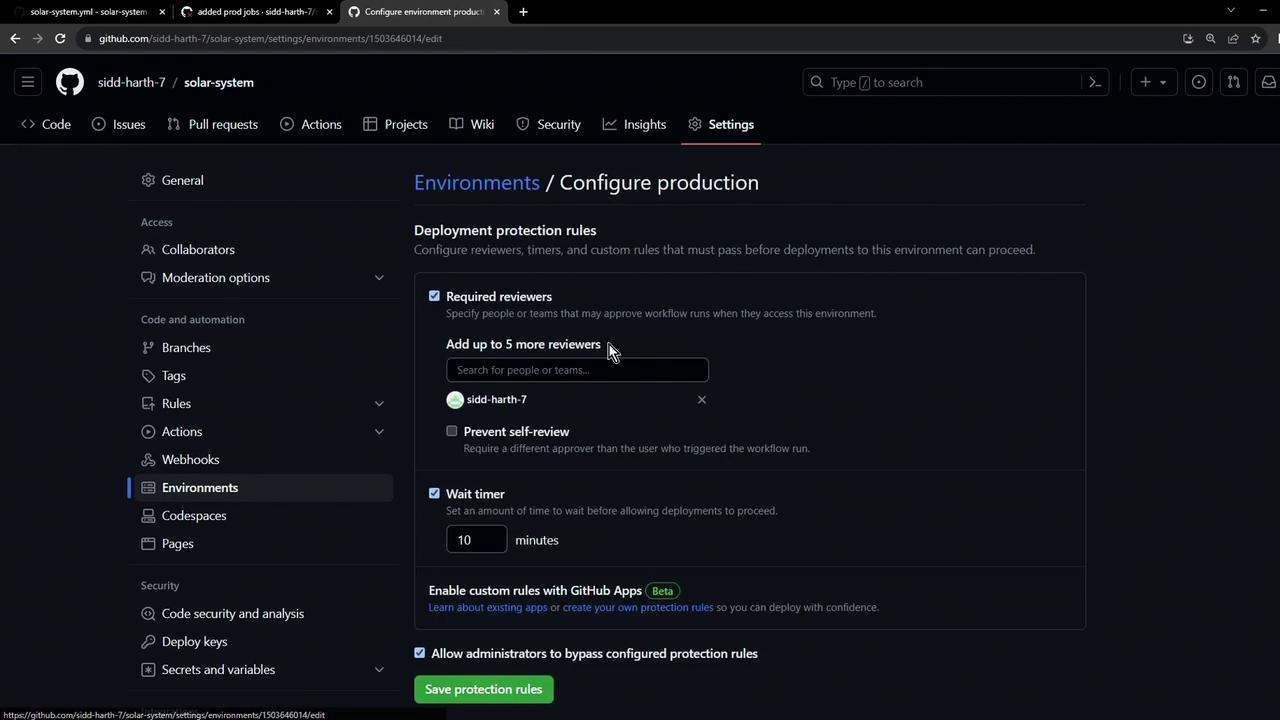GitHub Actions Certification
Continuous Deployment with GitHub Actions
Workflow Deploy to Kubernetes Prod Environment
In this tutorial, we’ll extend our GitHub Actions CI/CD pipeline to deploy Kubernetes manifests into a production environment. By cloning the existing dev-deploy and dev-integration-testing jobs, renaming them for production, updating manifest paths, and configuring environment protection, you’ll achieve a safe, repeatable deployment process.
Workflow Configuration
Begin by updating the workflow metadata, trigger conditions, and shared environment variables:
name: Solar System Workflow
on:
workflow_dispatch:
push:
branches:
- main
- feature/*
env:
MONGO_URI: "mongodb+srv://supercluster.d83jj.mongodb.net/superData"
MONGO_USERNAME: ${{ vars.MONGO_USERNAME }}
MONGO_PASSWORD: ${{ secrets.MONGO_PASSWORD }}
jobs:
unit-testing:
# existing configuration
code-coverage:
# existing configuration
docker:
# existing configuration
dev-deploy:
# existing configuration
dev-integration-testing:
# existing configuration
Production Deployment Jobs
Below is the new production deployment job, which depends on dev-integration-testing, runs against the production environment, and exports the ingress URL:
prod-deploy:
needs: dev-integration-testing
environment:
name: production
url: https://${{ steps.set-ingress-host-address.outputs.APP_INGRESS_HOST }}
runs-on: ubuntu-latest
steps:
- name: Checkout Repo
uses: actions/checkout@v4
- name: Fetch Kubernetes Cluster Details
run: |
kubectl version --short
echo "----- Nodes -----"
kubectl get nodes
- name: Save Nginx Ingress IP
run: |
echo "INGRESS_IP=$(kubectl -n ingress-nginx get svc ingress-nginx-controller \
-o jsonpath='{.status.loadBalancer.ingress[0].ip}')" >> $GITHUB_ENV
- name: Replace Tokens in Production Manifests
uses: cschleiden/replace-tokens@v1
with:
tokenPrefix: '{,}'
files: ["kubernetes/production/*.yaml"]
env:
NAMESPACE: ${{ vars.NAMESPACE }}
REPLICAS: ${{ vars.REPLICAS }}
IMAGE: ${{ vars.DOCKERHUB_USERNAME }}/solar-system:${{ github.sha }}
INGRESS_IP: ${{ env.INGRESS_IP }}
- name: Review Production Manifests
run: cat kubernetes/production/*.yaml
- name: Create MongoDB Secret
run: |
kubectl -n ${{ vars.NAMESPACE }} create secret generic mongo-db-creds \
--from-literal=MONGO_URI=${{ env.MONGO_URI }} \
--from-literal=MONGO_USERNAME=${{ vars.MONGO_USERNAME }} \
--from-literal=MONGO_PASSWORD=${{ secrets.MONGO_PASSWORD }} \
--save-config --dry-run=client -o yaml | kubectl apply -f -
- name: Deploy to Production
run: kubectl apply -f kubernetes/production
- name: Set App Ingress Host URL
id: set-ingress-host-address
run: |
echo "APP_INGRESS_HOST=$(kubectl -n ${{ vars.NAMESPACE }} get ingress \
-o jsonpath='{.items[0].spec.tls[0].hosts[0]}')" >> $GITHUB_OUTPUT
outputs:
APP_INGRESS_URL: ${{ steps.set-ingress-host-address.outputs.APP_INGRESS_HOST }}
Next, add a job to validate the live endpoint via Curl and JQ:
prod-integration-testing:
name: Prod Integration Testing
needs: prod-deploy
runs-on: ubuntu-latest
steps:
- name: Verify Live Endpoint
env:
URL: ${{ needs.prod-deploy.outputs.APP_INGRESS_URL }}
run: |
echo "Testing URL: https://$URL/live"
curl https://$URL/live -s -k | jq -r .status | grep -i live
Note: Ensure that
vars.NAMESPACE,vars.REPLICAS, andsecrets.MONGO_PASSWORDare defined in your GitHub repository settings or organization variables.
Job Overview
Here’s a quick breakdown of the full CI/CD pipeline:
| Job Name | Purpose | Depends On |
|---|---|---|
| unit-testing | Run unit tests | — |
| code-coverage | Measure code coverage | unit-testing |
| docker | Build and push Docker images | code-coverage |
| dev-deploy | Deploy to development namespace | docker |
| dev-integration-testing | Run integration tests against dev cluster | dev-deploy |
| prod-deploy | Apply production manifests to prod cluster | dev-integration-testing |
| prod-integration-testing | Validate production endpoint | prod-deploy |
Running the Workflow
After pushing these changes from a feature branch, GitHub Actions will schedule all jobs:
unit-testingcode-coveragedockerdev-deploydev-integration-testingprod-deployprod-integration-testing

Warning: Because the production environment has branch protection rules (only
mainallowed), any attempt to deploy from a feature branch will be blocked. Subsequent jobs in the workflow are skipped when this rule is not met.

Any unmet protection rule halts the prod-deploy job and skips downstream steps. In the next lesson, we’ll cover how to configure approvals and satisfy these rules for safe, automated releases.
Links and References
Watch Video
Watch video content